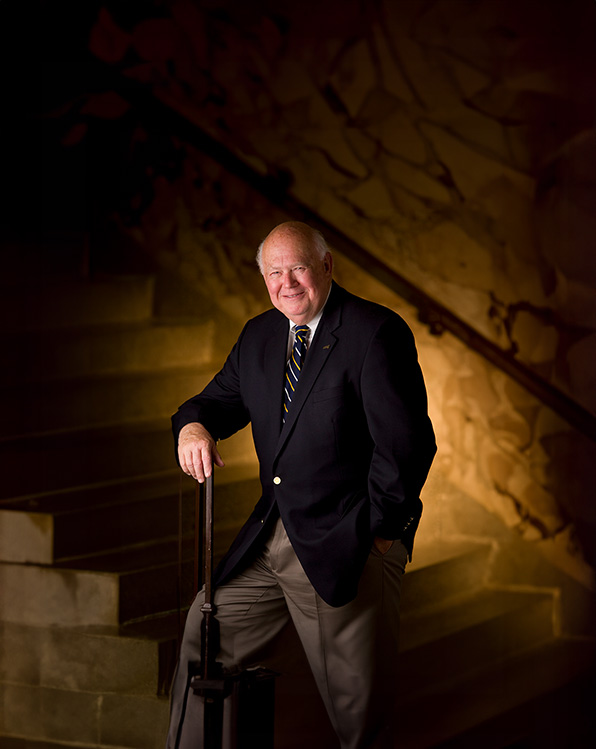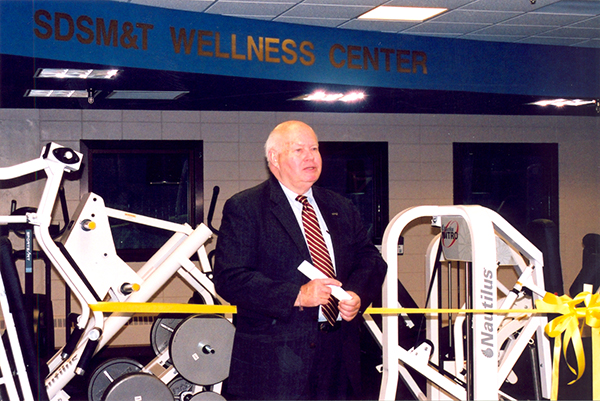South Dakota Mines Community Remembers Legacy of Former University President Dr. Charles Ruch

Dr. Charles Ruch came to lead South Dakota Mines at the perfect time – a time when his steady demeanor, talent for building relationships and focus on progress helped shape the university's future.
Ruch, who served as president from 2003 to 2008, passed away from natural causes on Saturday, Feb. 1, at his home in Boise.
“Chuck Ruch was a team builder,” said Dr. Karen Whitehead, Mines provost and vice president of academic affairs from 1997 to 2009. “Among other things, he brought campus and community together, enabling future presidents to build upon this. He was exactly the right man for the time. I am honored to have been part of his administration.”
During his tenure as Mines 16th president, Ruch’s goal was to make Mines a growing force in the world of science and engineering in the 21st century.
A goal he achieved, according to those who worked closely with him.
His list of accomplishments is lengthy, including implementing a strategic plan, completing Peterson Hall, the Black Hills Business Development Center, March/Dake Plaza, the Computational Mechanics Lab, the Tech Development Lab, and the Student Wellness Center. He also championed initiatives like the Women in Science and Engineering (WiSE) and the student tablet program and established new PhD programs.
Most of all, he built strong relationships with all stakeholders.
“President Ruch was the right person at the right time for South Dakota Mines,” said Dr. Patricia Mahon, former vice president of student affairs and dean of students. “Because of his experience as president of Boise State, he hit the ground running. He immediately embarked on a strategic plan for the university and included faculty, staff, students and support staff, as well as community and statewide leaders.”
Ruch’s strategic planning and collaborations played a key role in reinforcing and advancing the university’s mission to educate scientists and engineers, she said.
"SD Mines is in a strong position today due largely to the enduring legacy of President Ruch,” said Mines President Dr. Brian Tande. "From our collaborative and student-focused culture to the many improvements to our physical infrastructure, he made a lasting impact on our campus and across the state of South Dakota.”
Melanie Jeppesen, (IS 09) was on the university’s Student Association Senate during Ruch’s tenure as president. “He was a caring leader and a strong student advocate. I will always appreciate his mentorship,” she said.
As the student representative on the budget committee for student fees, Marc Lewis (CE ‘07) worked closely with Ruch and recalled how the former president was committed to ensuring funds were allocated where they would benefit the most students. “This left a lasting impression on me,” Lewis said. “He was truly putting the students at Mines as his highest priority, even in situations that may have appeared insignificant to others.”
Originally from New Jersey, Ruch earned a chemistry degree from Wooster College in Ohio in 1959. He then attended Northwestern University, obtaining a master’s degree in education in 1960 and a doctorate in education with a focus on organizational development in 1966.
He began his career in higher education at the University of Pittsburgh as a professor and department chair from 1969 to 1974. He spent the next 19 years at Virginia Commonwealth in Richmond, serving the final eight years as provost and vice president of academic affairs, where he managed two academic campuses and a medical school.
He served as the president of Boise State University for 10 years before retiring in 2003. He came to Mines that same year after his longtime friend and colleague Tad Perry, then the South Dakota Board of Regents (BOR) executive director, convinced him to apply for the presidency.
“I told him he was too young to do nothing,” Perry said of Ruch’s retirement from Boise. “He wasn’t at a point in his life where he was ready to sit on the sidelines.”
Perry met Ruch in 1988 when they both attended the Institute for Educational Leadership at Harvard University. In the late 1990s, the two served together in leadership positions on the Western Interstate Commission for Higher Education.
“He had an engaging leadership style that would create a common sense of purpose,” Perry said. “He was the perfect person to lead Mines when he failed retirement the first time. It was an important five years for the institution and the state of South Dakota.”
During his tenure at Boise, Ruch expanded research and academic programs, a focus of Mines and South Dakota at the time, Perry said. “He had great experience in advancing the research part of our agenda. He knew how to get funds out of Washington for research and how to get people together for a common purpose.”
Ruch also worked with Black Hills State University to create a cooperative relationship to share resources and avoid duplication, a partnership that continues today.
During Ruch's tenure as Mines president, he provided Perry with a fresh perspective and a new way to look at things. "I truly valued his wisdom and counsel,” Perry said.
Ruch also took the lead in collaborating with the presidents of the five other BOR institutions to propose a comprehensive funding plan to the state legislature for major building projects, Mahon said. As a result, each campus received funding for a major building project. South Dakota Mines received funding for two facilities: the Chemical and Biological Engineering/Chemistry (CBEC) building and the (James E. Martin) Paleontology Research Laboratory.
Suzi Aadland, the longtime director of the university’s Ivanhoe International Center, remembers Ruch’s knack for implementing positive organizational change. “Dr. Ruch arrived on campus in 2003, and I was working on a research project for a class on organizational change and behavior. As I was reading several books on the topic, I watched him approach and implement changes exactly as those books recommended. I believe he was a master of the process. It was an impactful learning experience that I will never forget,” she said.
Ruch is fondly remembered as a fair and compassionate leader with an open-door policy. “There were times when emotions ran high, yet he always remained a calming influence,” Aadland recalled. “I don’t think I ever heard him raise his voice or show any sign of anger. He was a good man with a great sense of humor.”
“He was also focused on building institutional ownership with faculty and staff, stressing the success of the university, recruiting, retention and education was everyone’s responsibility,” Aadland added. “He corrected people who made comments such as ‘that’s their job, not mine’ stating it’s everyone’s job.”
Ruch’s second retirement did not last long either. After Mines, he served as interim dean of education at both Texas Tech and Armstrong universities before officially retiring in 2015. Over his career, Ruch wrote more than 50 academic pieces, including books, book reviews and research publications.
“When Dr. Ruch was planning his retirement from Mines, he commented that he envisioned wearing a hard hat while sitting on his deck with his feet on the railing in Boise, sensing construction sounds on all four corners of the Mines campus,” Mahon said.
Ruch’s influence stretches across decades, multiple institutions and several states. Those who knew him remember his strong leadership and dedication to creating a lasting impact wherever he served. Even those who never met him continue to benefit from his achievements.
Ruch is survived by his wife of 64 years, Sally; four children, Cheri, Charlie, Chris, and Cathleen; and four grandchildren, Nicholas, Andrea, Michael, and Christopher.
A celebration of life will be held on March 15, 2025, at 10:30 a.m. at the First Presbyterian Church in Boise.